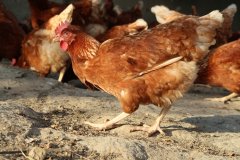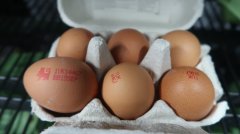British study: 72% of Britons are willing to buy native eggs raised by insects
In the face of the delicious ingredients on the table, have you ever thought about the situation at the production and feeding end? Just imagine, in the process of breeding chicken or eggs on today's plate, the feed eaten is not cereal, but insects. Will this affect your willingness to buy or eat?
Insects as fodder become the latest trend

In recent years, in the process of raising poultry, insects have become a method to replace soybean powder. In the process of breeding laying hens, there have been similar results. It has been proved that using live insects, such as black water gadfly (BSFL), to partially or completely replace soybean powder can reduce the environmental burden caused by the production of original feed, and at the same time solve the food waste caused in the process of producing raw feed. It also improves the animal welfare of hens who love to eat live insects, which has no effect on the quality and taste of eggs.
The European Union approved the use of live insects in feed for poultry in 2017, pushing the invisible industry to a peak by legalizing the use of live insects.
In the face of food materials raised by live insects, consumers' fear becomes lower.
In the past, consumers may have a certain fear of the food "raised" by insects, mainly because of their aversion to the insects themselves, but this trend has changed year by year. there is a growing acceptance of farmed fish and chicken gizzards that use live insects as feed.
The June 2021 issue of the journal Future Foods examines whether eggs produced by laying hens that eat live insects can be accepted by consumers. The study found that 72 per cent of British consumers were willing to pay for such eggs.
The sustainable environmental protection and natural value of insects make consumers feel better about the eggs produced.
The study points out that the main reason for the increase in consumer acceptance is to understand the environmental sustainability issues behind the use of live insects, and to believe that eating live insects is much healthier for hens than ordinary feed, and that there are healthy hens in order to have healthy eggs.
The study also mentioned that apart from the United Kingdom, in France and Italy, people's fear of insects absolutely affects whether such products are accepted by the market, but for consumers who pay attention to issues such as animal welfare and environmental sustainability, even if they accept such products for the first time, they will have a very high degree of acceptance because they are in line with their personal beliefs.
Opponents not only hate insects, but also focus on safety and price.
Although the use of this kind of feed is still controversial in the minds of consumers, in fact, the two parties who support and oppose it are caused by different definitions of the nature of the product.
Consumers do not have a certain level of price expectations for products, and consumers who care about animal rights will think that they will be willing to buy even if the price increases, and this kind of purchase behavior is to express their support for the position of the brand. on the other hand, some consumers will think that eating live insects that are not so pleasant, and that the price of the product should not be too high in order to meet the "value" of the insect itself.
In addition to the aversion to insects will affect consumer motivation, consumers also focus on safety, taste, price and nutrition, the study found that as long as it is based on safety and in line with the expected price, consumers' willingness to spend will also increase.
Only through proper planning and development can we truly achieve sustainability.
The use of live insects as feed seems to be a good card for ecological sustainability and animal welfare, but if this market is gradually expanded, it may lead to another ecological crisis.
In fact, there is a stable balance between ecological supply and demand, and if either side pays more attention to it, it may have a huge ecological impact. The resources needed for breeding live insects, including water resources, land resources, and the environmental conditions around the breeding sites, are all interrelated factors in this industrial system.
Because of this, if there is no good planning and proper management, it may lead to an imbalance between supply and demand, making the original intention deviate from the track. therefore, the use of such feed sources and related norms still need clear rules for the use of such feed sources. in order to develop a real sustainable ecology.
- Prev

Guidelines for friendly egg production revised the increase of space in chicken sheds can not be forced to change feathers and lay eggs.
The Taiwan Council of Agriculture recently revised and sent a letter to the definition and guidelines of the Egg friendly production system. The biggest difference before and after the revision lies in reducing the feeding density of grazing and flat feeding, not being forced to molt, and that few hens are not allowed to enter the non-friendly production system after elimination.
- Next

On the eggshell is a badge full of pride. British Poultry Egg Market and Consumer observation
Milk, meat and eggs are the main sources of human animal protein. with the increase of human population and the improvement of living standards, the demand for animal protein increases, especially the growth rate of egg production is greater than that of milk and meat. For example:
Related
- On the eggshell is a badge full of pride. British Poultry Egg Market and Consumer observation
- British study: 72% of Britons are willing to buy native eggs raised by insects
- Guidelines for friendly egg production revised the increase of space in chicken sheds can not be forced to change feathers and lay eggs.
- Risk of delay in customs clearance Australia suspends lobster exports to China
- Pig semen-the Vector of virus Transmission (4)
- Pig semen-the Vector of virus Transmission (3)
- Five common causes of difficult control of classical swine fever in clinic and their countermeasures
- Foot-and-mouth disease is the most effective way to prevent it!
- PED is the number one killer of piglets and has to be guarded against in autumn and winter.
- What is "yellow fat pig"? Have you ever heard the pig collector talk about "yellow fat pig"?

